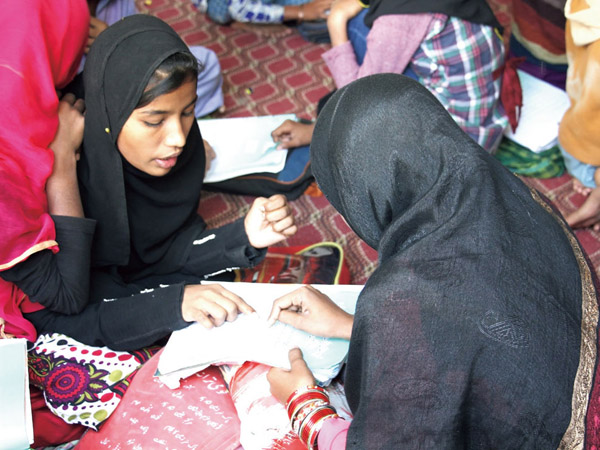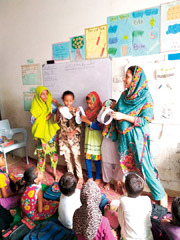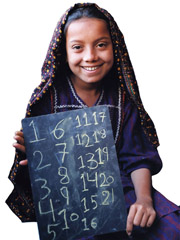Special Issue
South Asia
The Beat of 1.8 Billion People
Human Resources Development
Gender
Learning Cultivates the Power to Live
There are many children and adults in Pakistan who, for various reasons, do not have access to basic education and, as a result, cannot read, write, or calculate. While many of these are girls and women, there are now changes underway around the country to rectify this situation.

"Do you understand this bit?"
Both the teachers and the students frequently come from the same local community.
Literacy is a pathway to a better life
The literacy rate for people aged 15 or over in Pakistan is 60 percent for the general population. This drops even lower, to 20 percent, among women in rural villages. There are several determining factors, such as geographical reasons with many homes located far from schools, household poverty, social and cultural norms that women do not need to be educated, and a lack of coherent quality school education. Everyone has the right to access education, and basic education is vital in order to live with dignity. Accordingly, attention is being paid recently to "non-formal education," which provides places to learn outside schools.

Teachers at non-formal schools are admired as symbols of working women.
Working with the government of Pakistan, JICA has provided cooperation to improve the quality of education through creating a system to promote non-formal education, as well as developing curriculums and teaching materials, and training teachers. Many of the participants are girls or women, and women make up nearly 80 percent of the adult literacy classes aimed at people 16 or older. In addition to reading and writing, classrooms using teaching materials to teach animal husbandry or dressmaking to improve incomes, or health and nutrition to improve the quality of life, have been opened around the country. "A questionnaire informed us that about 90% of people in this non-formal education gained confidence in themselves through being able to read and write," noted the JICA Expert who was in charge of this project. "However, learning here is just a step on the way to a better life. We hope that these learners will gain the power to forge their own paths after graduation. Also, by involving local men in the community learning experience of non-formal education, their awareness will also change."
As a result of this initiative, non-formal education has been incorporated into government policy, with students being able to get officially-recognized graduation certificates. The government is pushing people to exercise their right to learn through such non-formal education. The joy of learning is empowering people to live better lives.

"I'm so glad I can go to school!"




scroll